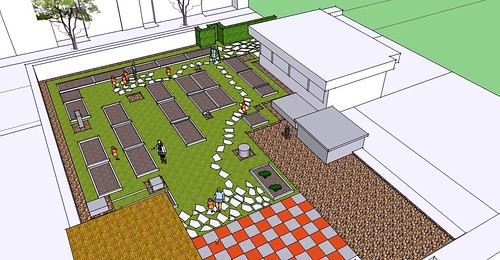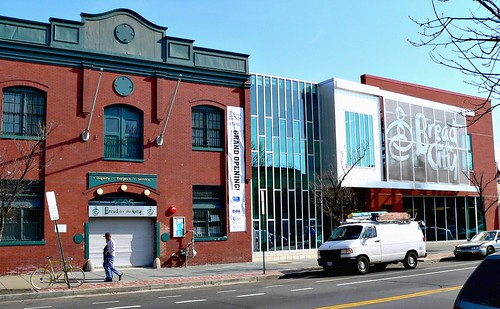DC charity develops large rooftop garden to serve the city

Posted April 20, 2011 at 1:25PM
I was interviewed earlier this week by a filmmaker who is working on a documentary on urban gardening and agriculture. The main point I tried to make was that, for city gardens to succeed, we need them to support rather than displace traditional urbanism.
Today I came across a wonderful example of exactly that. Long one of DC’s best-regarded charities, Bread for the City is known for providing food and much more (including a variety of material and social services) to the city’s underserved populations. The organization has just completed a major expansion of its Northwest (DC) Service Center, and is (literally) capping off the building project with a 3500-square-foot rooftop vegetable garden with 30 gardening beds.
Elahe Izadi writes in the local blog DCentric:
“The idea came out of an initiative by a couple of employees at the organization’s Southeast center, where they had planted some herbs and vegetables on the patio. Development Associate in Communications Greg Bloom says the organization then decided to turn the Northwest center’s new green garden into one that grew more than just plants that absorb rain water.”
Izadi says that the nonprofit green-roof organization DC Greenworks will provide assistance, and Bread for the City’s clients will help with maintenance.
A lack of access to healthy food is a major problem in distressed city neighborhoods across America. This will help, and that’s not all. Izadi continues:
“[T]his garden won’t be able to feed all Bread for the City clients (the organization serves 4,500 families a month — that’s a lot of food for a roof to produce). Instead, it will primarily serve as a way to educate clients and the community about food justice and also serve as a green space ‘to foster reflection’ and spur dialogue between and among clients, community organizers and donors about food sustainability.”
According to the organization’s web site, Bread for the City was created in 1976 by a coalition of downtown churches to feed and clothe the poor. In 1995 it merged with Zacchaeus Free Clinic, which provided medical services. The organization operates two facilities in DC to provide direct, free services to low-income residents “in an atmosphere of dignity and respect.”
I came across this story on the same day as I read a considerably less hopeful article in The Washington Post about the closing of an inner-city garden that has long served residents but is on private property now needed by the owners for renovations. In addition, Neil Takemoto has a new story posted on his always-engaging blog Cooltown Studios about how smaller food stores are regaining popularity in urban areas.
Move your cursor over the images for credit information.

